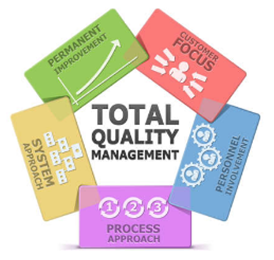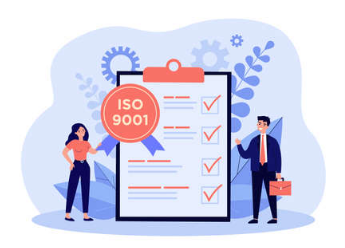- Home
- Total Quality Management Methodology
- Types of TQM
Types of Total Quality Management
ONE or more TYPEs of total quality management? Industry Is Changing Fast.

Are there different types of total quality management?
Many organizations still believe that Quality means having some certification such as ISO9001, 18001, 14001, or any other certification. This does not necessarily point to a wrong path, but they suggest a wrong "cause", since Quality Management must mean more results and productivity for the organization, the seals, awards and certifications are a consequence.
Almost everyone has heard of total quality management and ISO 9000. Some companies that have tried to implement TQM have had experiences ranging from limited success to downright failure. Some companies and individuals think that ISO 9000 is just another name for Total Quality Management (TQM).
To understand the relationship between the two, we need to look at them individually and then comparatively. In this way we can understand each and then explore their relationships, commonalities and differences.
A good starting point is a definition of TQM: a well-planned, companywide process, integrated into the company's business plan, that achieves the goal of never-ending continuous improvement of all business processes in order to satisfy customer requirements, both internal and external.
The definition suggests that TQM is a process and a journey, not a destination. It is a philosophy, culture and way of doing business. If TQM is seen as "something else to do" rather than "this is our culture and way of doing business," then the effort will probably not succeed. What signifies success with TQM? Performance excellence and customer delight.
Types of quality management systems
ISO 9000

Quality management system according to the model established in the ISO 9001 standard.
- The ISO 9000 (The current version of ISO 9000 is ISO 9000: 2015).
- ISO 9001, Quality management systems: Requirements
- ISO / TS 9002, Quality management systems: Guidelines for the application of the ISO 9001: 2015 Standard.
- ISO 10001, Quality management: Customer satisfaction. Guidelines for codes of conduct for organizations.
- ISO 10002, Quality management: Customer satisfaction. Guidelines for the handling of complaints in organizations.
- ISO 10003, Quality management: Customer satisfaction. Guidelines for the resolution of conflicts external to organizations.
And others more...
The ISO 9000 family of standards is based on eight quality management principles, which are intended to lead an organization towards long-term success:
- Customer Focus.
- Leadership.
- Staff Participation.
- Process-Based Approach.
- System Approach to Management.
- Continuous Improvement.
- Fact-based Approach to Decision Making.
- Mutually Beneficial Supplier Relationships.
Quality Management Systems According to the European EFQM Model.
It was created in 1988 by an important group of companies, which had the backing of the European Commission.
Its mission is to promote excellence in European organizations and improve their competitiveness, increasing their international projection.
It aims to promote self-evaluation as a key element for the diagnosis and improvement of organizations. Currently, the Foundation is made up of more than 600 companies and entities.
This Foundation created the EFQM Model, which is characterized by:
Be a benchmark of how organizations should define and organize themselves to achieve excellence. It is based on the concept of Total Quality.
It revolves around the following premise: “customer and employee satisfaction and the impact on society are achieved through leadership that drives policy and strategy, personnel management, resources and processes towards the achievement of excellence in the organizations”.
NGO With Quality.
Quality management systems according to the model established in the "NGO (Non-Governmental Organizations) with quality" standard.
The 'NGO with quality' standard was promoted by INTRESS and has been developed by different Spanish NGOs. In its development, the requirements of the model proposed by the ISO 9001 standard and some innovative elements of the European EFQM quality management model were taken into account.
Even when your organization successfully achieves and maintains ISO 9000 or other certification, it is only the first step, albeit clearly defined and focused. Successful organizations will maintain their ISO 9000 or other certification, while persistently working towards TQM.
This and other materials on this topic can be found at InArtifexYou.
Also we include our international certification programs.
Sign up and increase your knowledge factor and value of your professional performance.